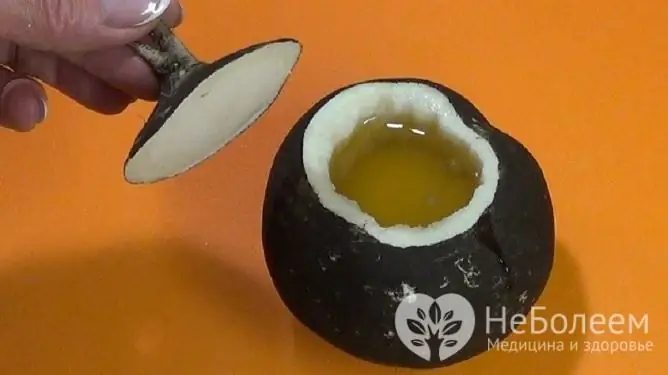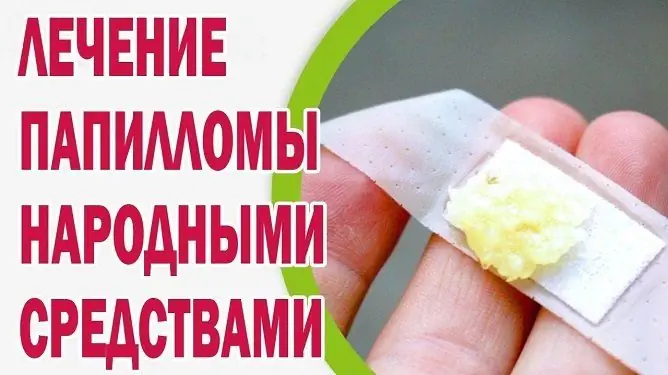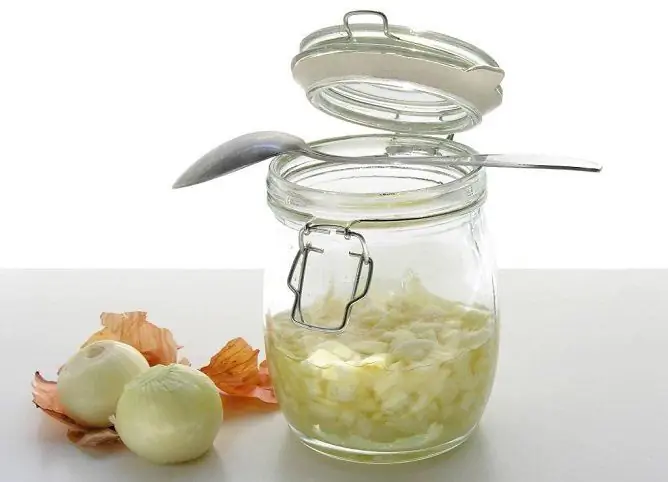- Author Rachel Wainwright wainwright@abchealthonline.com.
- Public 2023-12-15 07:39.
- Last modified 2025-11-02 20:14.
Treatment of cough with folk remedies in adults
The content of the article:
- How to get rid of dry cough with folk remedies
- How to cure sputum cough with folk remedies
- How folk remedies can get rid of chronic cough
- Folk remedies for cough for allergic bronchitis
- How to treat a heart cough
- Cough and its causes
- Basic rules for cough treatment
- Video
Folk remedies for coughs are very popular. With proper application, traditional medicine methods can alleviate the patient's condition and eliminate such an unpleasant symptom as a cough.

Popular folk remedy for cough treatment - steam inhalation
The list of medicines currently used to treat cough is huge. However, many people do not give preference to pharmaceuticals, but to folk recipes, believing that they are quite effective and safe. Indeed, medicines are expensive, created by chemical synthesis, and have a number of side effects. But folk remedies for coughs for adults also have a number of disadvantages:
- therapy with medicinal plants can also be accompanied by the development of side effects;
- the chemical composition of medicinal plants is not exactly known, in contrast to pharmaceuticals;
- to achieve the effect, phytotherapy should be carried out for a long course;
- homemade recipes for severe disease are usually ineffective.
However, it is not worth denying completely the centuries-old experience of traditional medicine.
How to get rid of dry cough with folk remedies
With a dry cough, folk remedies in combination with drug therapy make it possible to improve the patient's condition in a short time and accelerate recovery. How to cure a cough with folk remedies? The best way to soothe the irritated mucous membrane of the upper respiratory tract and thereby reduce the frequency and severity of dry coughing attacks is steam inhalation, but they can be used if there is no increase in temperature. To carry out them, you first need to prepare a solution, we will give the most popular recipes:
- Decoction of potatoes. Thoroughly wash 3-4 medium potatoes, peel and boil until tender.
- Soda solution. Boil 0.5 liters of water and add 2 teaspoons of baking soda to it.
- Salt solution. Dissolve 1 tablespoon of table salt in 0.5 liters of boiling water.
- Essential oils. Boil two glasses of water and add 2-3 drops of essential oil (cedar, mint, lavender, tea tree) to it.
To prevent burns of the skin of the face, eyes and mucous membranes of the nose and oropharynx, the solution for inhalation should be cooled to 58 ° C before use. Then they bow their heads over a saucepan with hot solution and cover with a towel. Breathe through your mouth. The duration of inhalation should not exceed 15 minutes. You can repeat the procedure 2-3 times a day.
Oil compresses also help with dry coughs, but they can only be put on when ARVI runs without temperature. To set up such a compress, you should take half a glass of any vegetable oil and heat it in a water bath to 40 ° C. Do not heat the oil over an open fire, as in this case it heats up very quickly to high temperatures and can cause serious burns. Moisten a piece of clean cotton cloth with warm oil and wrap it around the chest. Cover the oiled cloth with wax paper and fix the compress with a woolen scarf. The compress is kept for two hours. This procedure is best done in the evening, shortly before bedtime.
A decoction of needles in milk also helps to quickly cope with a dry cough. The healing power of conifers has been known for a long time. It is no coincidence that many sanatoriums specializing in the treatment of respiratory organs are located in pine forests. Such a popular cough remedy as pine milk allows you to create a "mini-sanatorium" at home. To prepare it, you should thoroughly rinse 50 g of pine buds and fill them with two glasses of milk. Bring to a boil and simmer for 2-3 minutes. Strain. Drink the broth during the day in small sips.
A dry cough can be associated not only with a respiratory tract disease or irritation with chemicals, smoke, dust. In some cases, it is caused by diseases of other organs, for example, hyperplasia (enlargement) of the thyroid gland or reflux esophagitis. Therefore, if attacks of dry cough persist for a long time, despite the use of medication or folk antitussives, you should definitely consult your doctor.
How to cure sputum cough with folk remedies
A cough that produces sputum is called a wet cough. Its treatment should be aimed at diluting sputum and enhancing its excretion (expectoration) from the bronchial tree. The most commonly used folk recipes for coughing up phlegm:
- Warm milk with alkaline mineral water. Boil 2/3 cup of milk and add 1/3 of alkaline mineral water, such as Borjomi, to it. Drink 2-3 times a day hot in small sips.
- Milk with honey and butter. Add 10 g butter and 1-2 teaspoons of honey to a glass of hot milk. Stir well. Drink warm just before bed.
- Onion syrup. Peel medium-sized onion and rinse under running water. Chop finely, cover with 2-3 tablespoons of sugar and leave for 10-12 hours. Drink the resulting syrup in small portions throughout the day.
- Radish juice with honey. Wash the radish thoroughly and cut off the top. Then, with a sharp knife, cut out the core, pour honey into the resulting cavity. Close the top cut off earlier and leave in a warm place. Radish juice with honey is taken 4-5 times a day for a tablespoon.
To facilitate the discharge of sputum, you need to drink plenty of fluids. We recommend warm tea with lemon, berry juice, compote.
How folk remedies can get rid of chronic cough
Chronic cough is a common problem. The most common cause of its occurrence is chronic bronchitis, including smoker's bronchitis. In this regard, the question of how to treat an old cough is far from idle. Traditional medicine in this case recommends:
- Butter with honey and aloe. Rinse 100 g of aloe leaves under running water, grind them and squeeze out the juice. In a saucepan in a water bath, melt 100 g unsalted butter and flower honey each. Stir the butter-honey mixture until smooth and add aloe juice to it. Keep refrigerated. Take one tablespoon at night, after dissolving in a glass of hot milk. The course of treatment should last at least three months.
- Decoction of medicinal herbs. Put 25 g of pine buds, yarrow, rose hips and wormwood herbs in a saucepan. Pour the collection with 1.5 liters of cold water. Bring to a boil and simmer over low heat for 10 minutes. Cool and drain. Add 125 ml of good cognac, 250 ml of honey, 100 ml of aloe juice to the broth. Take the resulting mixture three times a day for a tablespoon 20-30 minutes before meals.
- Birch tar. Add 1-2 drops of birch tar to half a glass of warm milk. It should be taken in the morning on an empty stomach and immediately before bedtime.
Folk remedies for cough for allergic bronchitis
Cough in allergic (asthmatic) bronchitis occurs as a result of exposure to the mucous membrane of the bronchi of substances to which the human body is hypersensitive. The main symptoms of this disease are:
- paroxysmal dry cough (sometimes with scanty mucous sputum);
- labored breathing;
- wheezing behind the breastbone (in the chest).
Patients with allergic cough should try to minimize contact with potential allergens (perfumes, household chemicals, house dust, pet hair). In addition, they are advised to rinse their nose and mouth as often as possible, as well as gargle with clean boiled water.
Traditional medicine recommends taking decoctions of nettle, St. John's wort, string, eucalyptus, geranium and yarrow for allergic coughs. However, in this case, it is categorically contraindicated to carry out herbal medicine without the agreement of the attending physician. The fact is that any medicinal plant contains biologically active substances, which in themselves are capable of provoking the development of an allergic reaction, which will lead not to an improvement, but to a significant deterioration in health.

Radish juice with honey is good for the discharge of phlegm with a wet cough
How to treat a heart cough
The cause of cardiac cough is stagnation of blood in the small (pulmonary) circle of blood circulation, which is associated with insufficient contractile activity of the myocardium. That is, acute or chronic heart failure leads to the development of this pathology, which requires diagnostics and intensive drug treatment. Attempts to treat a heart cough with folk remedies do not lead to a therapeutic effect. In addition, delayed access to medical care threatens rapid progression of heart failure and the development of a number of complications, and in severe cases, even death.
Cough and its causes
Cough is a protective reflex reaction of the body aimed at cleansing the tracheobronchial tree from foreign bodies (food pieces, dust) or irritating agents (sputum, blood, mucus, pus). Its development is caused by irritation of the nerve receptors located in the mucous membrane of the airways. From them, a nerve impulse is transmitted to the cough center located in the brain.
At the beginning of the coughing act, the person takes a deep and short breath. Then there is a sharp contraction of the muscles of the diaphragm, abdominal wall, due to which there is a forced exhalation through the mouth.
Cough is not an independent disease. This is just one of the symptoms that accompany many pathologies of the respiratory system, ENT organs, and sometimes the cardiovascular and even the digestive system. The reasons for its occurrence can be:
- foreign bodies of the airways;
- acute respiratory diseases (cough can persist for a long time even after a cold);
- bronchitis;
- pneumonia;
- irritation of the airways by inhalation of air contaminated with toxic substances, smoke or dust;
- bronchial asthma;
- sinusitis;
- otitis;
- rhinitis (runny nose);
- some diseases of the nervous system (neurogenic cough);
- tuberculosis;
- lung cancer;
- tumors of the mediastinum;
- gastroesophageal reflux.
A cough that intensifies at night and in the supine position often indicates the presence of chronic heart failure in the patient.
A cough can also be a manifestation of an allergic reaction.
According to the amount of discharge, dry and wet cough is emitted (it is sometimes also called "wet"). In this case, the sputum can be mucous, mucopurulent, purulent, bloody.
Depending on the duration of the pathological process, coughing happens:
- acute - lasts no more than 15 days;
- protracted - lasts from 15 to 30 days;
- subacute - lasts 1-2 months;
- chronic (old) - over two months.
Treatment of cough with folk remedies should be carried out taking into account the cause of the pathological process, the nature and duration of the cough.
Basic rules for cough treatment
The onset of cough can be due to the influence of various reasons, therefore, there are no "most effective" methods of cough treatment, equally effective in any clinical situation.
Most often, a cough develops against the background of acute respiratory diseases and bronchitis. In this case, in addition to antitussives, the patient is prescribed bed rest, copious warm drinks, and vitamin preparations.
In severe bronchitis, as well as in pneumonia, it becomes necessary to carry out antibacterial and anti-inflammatory therapy.

When coughing, a generous warm drink is recommended.
The approach to cough treatment is determined by its type. A strong dry cough brings a lot of discomfort to a person. Usually it intensifies in the evening and night hours, thereby disrupting the patient's sleep. The cause of its occurrence is the irritation of the mucous membrane of the respiratory tract, therefore, folk remedies for dry cough are aimed at eliminating this irritation.
A wet cough is accompanied by expectoration of sputum, which is mucous, mucopurulent, purulent, bloody. In some cases, the sputum is very thick and viscous, and the patient has difficulty clearing his throat. Its congestion in the bronchi is one of the risk factors for the development of pneumonia. To facilitate its excretion, agents are used to dilute sputum (mucolytics) and improve its expectoration (expectorant fees).
Video
We offer for viewing a video on the topic of the article.

Elena Minkina Doctor anesthesiologist-resuscitator About the author
Education: graduated from the Tashkent State Medical Institute, specializing in general medicine in 1991. Repeatedly passed refresher courses.
Work experience: anesthesiologist-resuscitator of the city maternity complex, resuscitator of the hemodialysis department.
Found a mistake in the text? Select it and press Ctrl + Enter.






